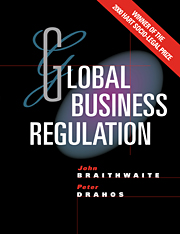20 - Contests of Actors
Published online by Cambridge University Press: 04 August 2020
Summary
States
Realist Power
Our data have demonstrated the unsurprising conclusion that many different kinds of actors have played important roles in the globalization of business regulation. Some might read the data selectively as demonstrating the death of the nation-state. This would be an erroneous reading of the facts we have assembled. Notwithstanding the complex plurality of actors we have shown to be involved in global regulatory games, if we ask the crude question, 'which is the type of actor that has had the greatest influence?', the answer is fairly clearly the nation-state. If we ask which single actor has had the greatest influence, that answer is even clearer - the US state.
What has changed is the nature of state power. As Stopford and Strange (1991: 1) put it: 'states are now competing more for the means to create wealth within their territory than for power over more territory. Where they used to compete for power as a means to wealth, they now compete more for wealth as a means to power'. At the same time, we have shown that in the era of information capitalism and the new regulatory state, control from the nation's territory of abstract objects like patents is crucial to building the nation's wealth, as is embedding global principles of regulation that suit the wealth-creators from the state's territory. The resilience of a US power that many had expected to wane in the 1990s can be understood in terms of the masterful work of the Clinton administration in these arenas.
Table 20.1 shows that in every chapter the US state is one of the most important actors. The UK is clearly the second most important state actor, with twelve entries in Table 20.1, followed by Germany with four, France and Japan with three, and Sweden and the Soviet Union with two. The Nordic countries are state players with an influence beyond their size across a number of domains. This is particularly so in the many arenas, like the OECD chemicals regime (Chapter 12), which have instituted a lead-country approach, where states take it in turns to lead technical committees on specific regulatory problems. Canada, Australia and India are among the weaker states that frequently chair technical committees on which so much of the real work of the globalization of regulation is done.
- Type
- Chapter
- Information
- Global Business Regulation , pp. 475 - 506Publisher: Cambridge University PressPrint publication year: 2000
- 1
- Cited by



